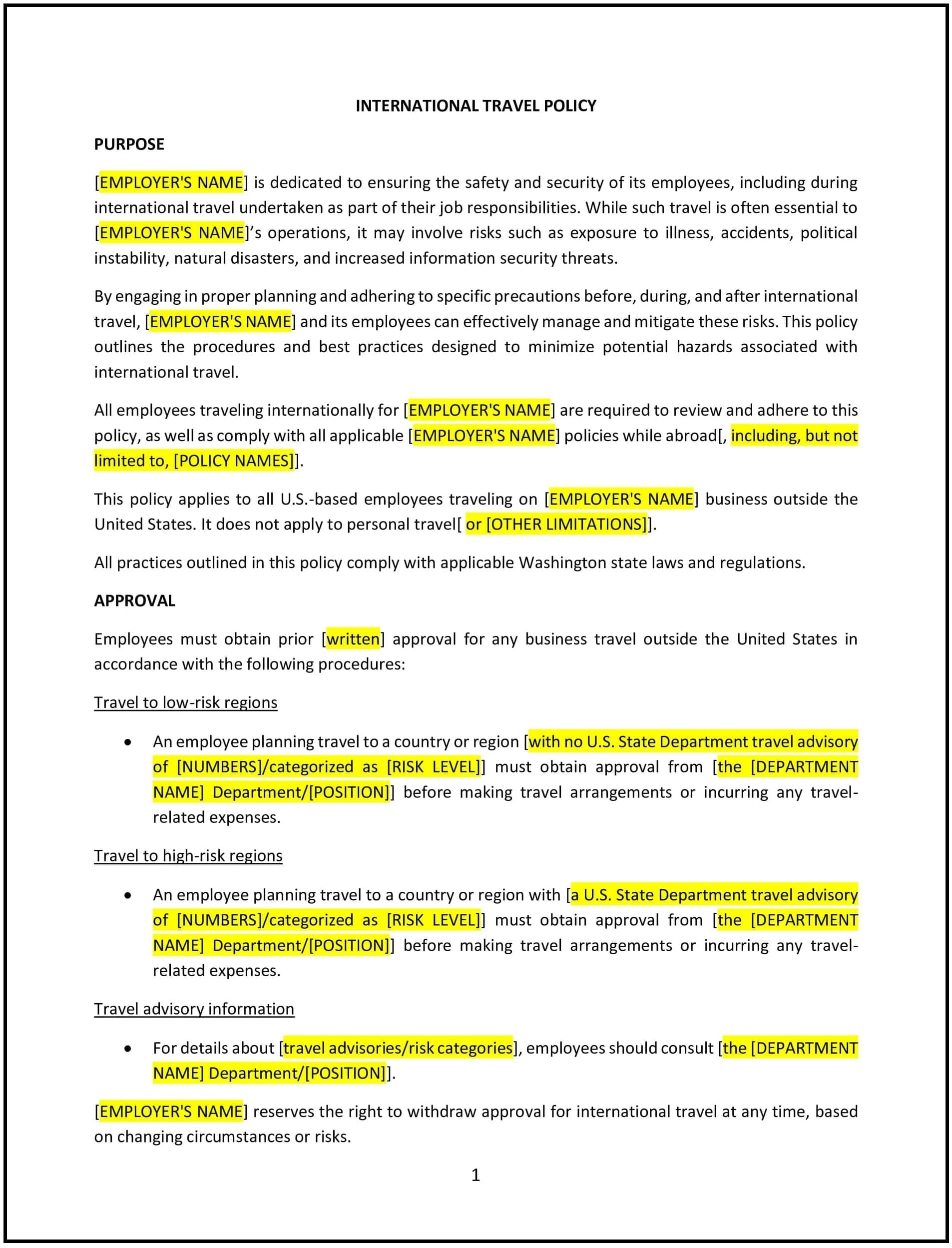International travel policy (Washington): Free template
Got contracts to review? While you're here for policies, let Cobrief make contract review effortless—start your free review now.

Customize this template for free
This international travel policy is designed to help Washington businesses manage and regulate employee travel for work purposes outside of the United States. The policy outlines the procedures for booking, approving, and reimbursing international travel expenses, promoting compliance with company guidelines, and safeguarding the well-being and safety of employees while traveling abroad. It also provides guidelines on risk management, health and safety, and the proper documentation required for international business trips.
By adopting this policy, businesses can ensure that international travel is efficiently managed, costs are controlled, and employees are supported during their trips abroad.
How to use this international travel policy (Washington)
- Define the scope of international travel: The policy should outline the types of business trips that qualify for international travel, including conferences, client meetings, and work-related events abroad. It should clarify which employees are eligible for international travel and under what circumstances.
- Implement travel approval procedures: Specify the process for obtaining approval for international travel, including submitting a travel request, justifying the purpose of the trip, and obtaining manager approval. Ensure that employees follow this process before booking international flights or making other travel arrangements.
- Set travel booking and expense guidelines: Provide clear guidelines for booking travel, including preferred travel agencies, online platforms, or internal booking systems. The policy should also specify which expenses will be reimbursed, such as airfare, hotel accommodations, meals, transportation, and any other business-related costs.
- Address travel safety and risk management: Outline the company’s commitment to employee safety while traveling internationally. This may include providing travel insurance, offering pre-travel safety briefings, and ensuring employees are aware of potential health risks, vaccinations, or other necessary precautions.
- Provide guidance on documentation and visas: The policy should specify the documentation required for international travel, such as passports, visas, and work permits. It should also outline the employee’s responsibility for ensuring they have the necessary travel documents before departing.
- Promote cultural sensitivity and compliance with local laws: Employees should be informed about cultural differences, local laws, and customs in the countries they will be visiting. The policy may include guidelines on respectful behavior, compliance with local regulations, and the company’s commitment to ethical business practices abroad.
- Address travel reimbursement and expense reporting: The policy should include a clear process for submitting expense reports after international travel, including the required documentation (e.g., receipts, invoices). Specify which expenses are eligible for reimbursement and any limits or caps on certain categories of expenses.
- Ensure compliance with Washington and federal laws: The policy should comply with Washington state laws, federal travel regulations, and any industry-specific guidelines that may apply to international business travel, such as export control laws or anti-bribery regulations.
- Review and update regularly: Periodically review and update the policy to ensure it remains compliant with changes in Washington state laws, federal regulations, or the company’s operations. Regular updates will help ensure the policy stays relevant and effective.
Benefits of using this international travel policy (Washington)
This policy offers several benefits for Washington businesses:
- Streamlines travel management: The policy provides a clear process for requesting, approving, and managing international travel, ensuring that trips are organized efficiently and that employees follow consistent procedures.
- Controls travel expenses: By outlining clear guidelines for what is reimbursed and setting limits on expenses, the policy helps control and manage the costs of international business travel, which is essential for budgeting and financial planning.
- Promotes employee safety and well-being: The policy ensures that employees traveling internationally have the necessary support, including health and safety information, travel insurance, and emergency contact details, helping them stay safe while abroad.
- Enhances compliance with legal and regulatory requirements: The policy ensures that both the business and employees comply with Washington state and federal laws, as well as any international regulations, minimizing legal risks.
- Enhances company reputation: Businesses that prioritize employee safety and comply with international regulations can enhance their reputation as ethical, responsible employers, which is important for attracting talent and maintaining positive relationships with clients and partners.
- Reduces risks: The policy addresses potential risks associated with international travel, such as safety concerns, health issues, and logistical challenges. It provides a framework for mitigating these risks and responding effectively if problems arise.
Tips for using this international travel policy (Washington)
- Communicate the policy clearly: Ensure all employees understand the international travel policy and its procedures. Include the policy in the employee handbook, review it during onboarding, and remind employees of any updates or changes to the policy.
- Provide pre-travel briefings: Offer employees pre-travel briefings to ensure they are informed about safety precautions, required documentation, and cultural sensitivities related to their destination. This helps employees feel prepared and confident when traveling abroad.
- Monitor and approve travel requests: Ensure that all international travel requests are reviewed and approved by the appropriate manager or department head. This helps control costs and ensures that all travel is essential for business operations.
- Set clear reimbursement procedures: Make the reimbursement process simple and transparent by providing clear instructions for submitting expenses and ensuring employees understand the limits and rules regarding what can be reimbursed.
- Offer support in emergencies: Have procedures in place for handling emergencies that may arise while employees are traveling internationally, including providing emergency contact numbers, travel insurance, and access to support services if needed.
- Review and update regularly: Periodically review the policy to ensure it remains compliant with Washington state laws, federal regulations, and any changes in the company’s travel practices. Regular updates will help keep the policy relevant and effective.